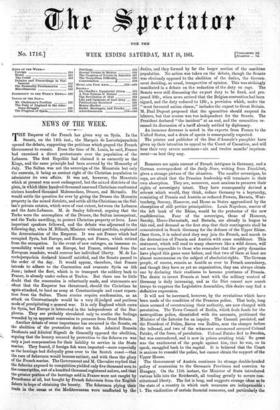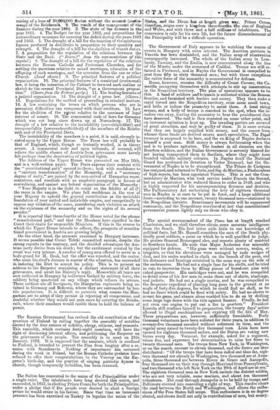Rumours are again current of French intrigues in Germany, and
a German correspondent of the Daily News, writing from Frankfort, gives a strange picture of the situation. The smaller sovereigns, he says, are afraid that the Prussian leadership will terminate in their own absorption. They are, moreover, most anxious to preserve their rights of sovereignty intact. They have consequently devised a schenie _which would, they think, reduce Germany to a heptarchy, consisting of Prussia and Austria as reduced Powers, Bavaria, Wur- temberg, Saxony, Hanover, and Hesse as States aggrandized by the absorption of still pettier principalities. Louis Napoleon, master of the left bank of the Rhine, would be the protector of the new eonffderation. Four of the sovereigns, those of Hanover, Saroity, Hesse-Darmstadt, and Bavaria, are already in league to this end, and demand as the first step that their contingents shall be concentrated in South Germany for the defence of the Upper Rhine. Once there, it is calculated they may join the French, and march to the destruction of Prussia and Austria with some confidence. This statement, which will read to many observers like a wild dream, will not seem impossible to those who remember that the petty dynasties have played this game once before, and that two of them at least are almost monomaniac on the subject of absolutist rights. The German people, of course, remain as hostile as ever to French ascendancy, and though they have as yet no organization, they can always obtain one by declaring their readiness to become provinces of Prussia. The desire to invest Prussia at least with the military control of Germany is daily increasing, and as the Diet cannot now march troops to suppress the Legislative Assemblies, this desire may find a definitive expression.
It will not be increased, however, by the revelations which have been made of the condition of the Prussian police. That body, long since accused of overstraining their authority, are now charged with peculation. The Town Council of Berlin, which finds funds for the metropolitan police, dissatisfied with the accounts, petitioned the Minister of the Interior for an inquiry. The Council persisted, and -the President of Police, Raron von Zedlitz, sent the charges before the tribunal, and two of the witnesses summoned accused Colonel Patzke, of the force, of peculation. Colonel Patzke fled to Sweden, but was surrendered, and is now in prison awaiting trial, So great was the excitement of the people against him, that he was, so to speak, smuggled back to the capital. It is believed that the Court is anxious to remodel the police, but cannot obtain the support of the Upper House.
The Government 'of Austria continues its strange double-headed policy of concession to the Germanic Provinces and coercion to Hungary. On the 11th instant, the Minister of State introduced various bills into the Reiohsrath, all tending greatly to secure con- stitutional liberty. The list is long, and suggests strange ideas as to the state of a country in which such measures are indispensable : 1. The vindication of certain financial measures, and particularly the
raising of a loan of 30,006,000 florins without the consent (zeniths- suing) of the Reicksrath. 2. The result of the management of the finances during the year 1860. 3. The state of the finances in the year 1861. 4. The Budget for the year 1862, and propositions for extraordinary measures for covering the deficit during the years 1861 and 1862.. 5. The draught of a bill for the taxation of the spirituous liquors produced in distilleries in proportion to their quantity and strength. 6. The draught of a bill for the abolition of transit duties. 7. A proposition for the regulation of the relations between the, State and the Bank. ("Bravo 1" fro* the tepreeestatives of this: capital.) 8. The draught of a bill for the regulation of the relations between the Roman Catholic and Protestant Churches, and for settling the questions.relative to mixed marriages, education of the offspring of such marriages, and the secession from the one or other Church. (Loud chem.) 9. The principal features of a political organization. 10. The principal features of a municipal (communal) law, it being the intention of the Cabinet to forward such outline or sketch to the several Provincial Diets, " aa a Government proposi- tion." (Cheers/mm the Federal party.) 11. The kadingfeatures.of a judicial organization. 12. The draught of a press law. (Cheers.)
13. Regulations for the method of proceeding in criminal matters.
14. A law containing the terms on which persons who are in pecuniary difficulties can compound with their creditors. 15. Law for the abolition of the tajtent relative to the maximum of legal interest of money. 16. The commercial code of laws for Germany which was not long since drawn up at Nuremberg. 17. The draught of a law relative to the inviolability (unverletzlichkeit) and irresponsibility (senverantwortlichkeit) of the members of the Reichs- rath and of the Provincial Diets.
The inviolability of the members is a point, it is said, strongly in- ` sisted upon by the Upper House. The Press law will probably be that of England, which, though so leniently worked, is in theory severe. A commercial eode and open tribunals, if secured, will relieve the middle classes of Austria from grievances more keenly felt perhaps than the deprivation of political rights. The Address of the Upper House was presented on May 10th, and is a wellnviitten paper. The Peers express their content with the " constitutional path" opened to them ; look with confidence to a "salutary transformation" of the Monarchy, and a " necessary degree of unity," are pained by the non-arrival of Hungarian repre- sentatives, and conclude with an emphatic paragraph in favour of
centralizing, and against any federal organization of the Monarchy : " Your Majesty is in the right to count on the fidelity of all (?) the races in the empire. We place full .confidence in the vow of four Majesty to uphold the general constitution as the inviolable oundation of your united and indivisible empire, and energetically to oppose any violation of the same, considering such violation an attack on the existence of the monarchy and on the rights of its several peoples."
It is reported that three-fourths of the House voted for the phrase "constitutional path," and that the Members have signified to the Court their desire for responsible Minis i Ministers. If this is the course to which the Upper House intends to adhere, the prospects of constitu- tional government in Austria are growing bright.
On the other hand, the pressure exercised in Hungary increases. It seems possible that Count Teleki committed suicide, despite the strong reports to the contrary, and the decided advantages the Aus- trian party derive from his death; but the excitement created by the event was very intense. A number of young men offered to serve as a body-guard for M. Deak, but the offer was rejected, and the orator, who since his rival's decease is master of the situation, has succeeded in inducing the Diet to accept his policy. This is to present an address to the Emperor containing a distinct statement of all their grievances, and await his Majesty's reply. Meanwhile all taxes are now collected in Hungary by collectors backed by military force, the soldiery being quartered on any village which refuses its arrears. These soldiers are all foreigners, the Hungarian regiments being re- tained in Germany and Bohemia, where they are surrounded by hos- tile populations. It is difficult to perceive what course the Hun- garians are to adopt if they persist in rejecting all compromise, and doubtful whether they would not gain more by entering the Reichs- rath, where their numbers would enable them to hold the balance of power.































 Previous page
Previous page